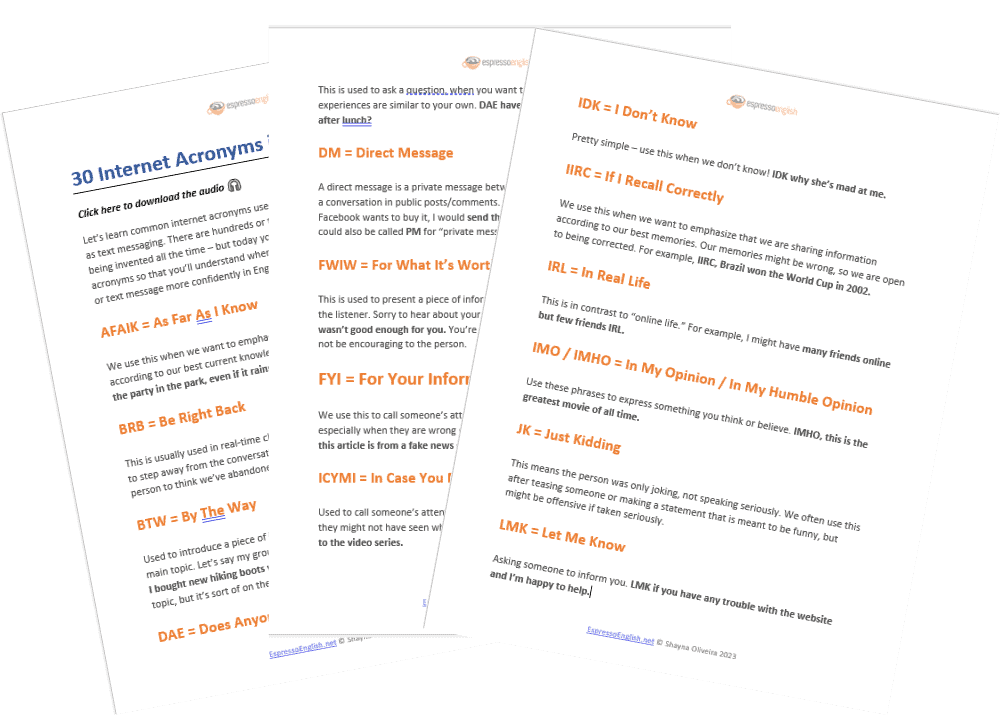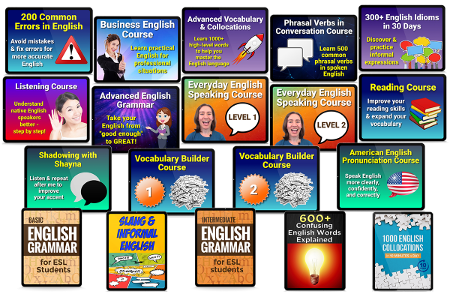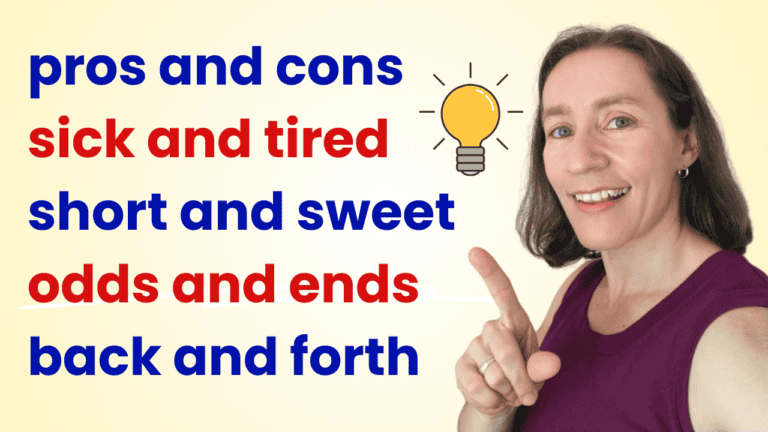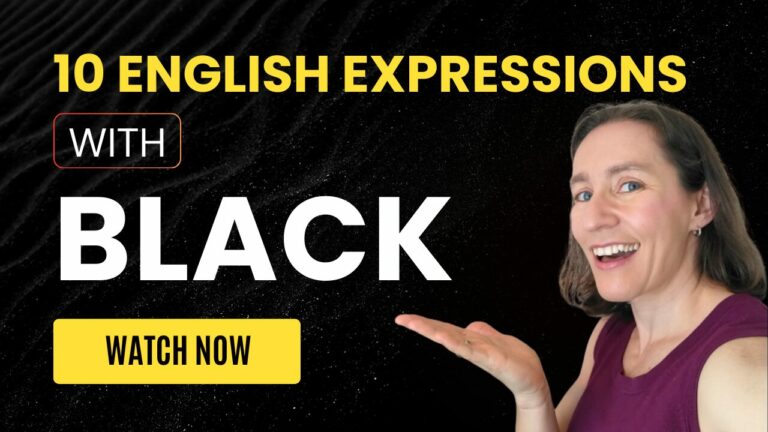
In today’s lesson we’re going to focus on common abbreviations used online as well as in chats and text messaging. This year, 2020, we’ve had to interact and socialize online even more than usual – and when typing or chatting online, many people use acronyms and abbreviations for expressions or short phrases, like LOL for “laughing out loud” in reaction to something funny.
There are hundreds or thousands of these, and new ones are being invented all the time – but today you’ll learn 30 of the most common acronyms so that you’ll understand when you see them on the internet.
I’m going to go through them pretty fast – I’ll just explain what they stand for and sometimes give a quick example – so pay attention and feel free to review this video several times to learn all of them.
AFAIK = As far as I know
We use this when we want to emphasize that we are sharing information according to our best current knowledge. For example, AFAIK we’re still having the party in the park, even if it rains.
BRB = Be right back
This is usually used in real-time chatting or exchanging messages, when we need to step away from the conversation for a few minutes and don’t want the other person to think we’ve abandoned them.

BTW = By the way
Used to introduce a piece of information that may be somewhat to the side of the main topic. Let’s say my group of friends is planning a hiking trip, I might say BTW I bought new hiking boots yesterday. That information is related to the main topic, but it’s sort of on the side, an extra, additional fact.
DAE = Does anyone else…
This is used to ask a question, when you want to know if other people’s experiences are similar to your own. DAE have a hard time getting anything done after lunch?
DM = Direct message
A direct message is a private message between two people, in contrast to having a conversation in public posts/comments. If I’m selling a toy and someone on Facebook wants to buy it, I would send them a DM with an address to meet.

FWIW = For what it’s worth
This is used to present a piece of information that may or may not be helpful to the listener. Sorry to hear about your breakup. FWIW, I always thought your ex wasn’t good enough for you. You’re presenting your opinion but it might or might not be encouraging to the person.
FYI = For your information
We use this to call someone’s attention to a specific piece of information, especially when they are wrong or when we are annoyed or irritated at them. FYI, this article is from a fake news site.
ICYMI = In case you missed it
Used to call someone’s attention to a post, video, event, announcement, etc. that they might not have seen when it was originally published. ICYMI, here’s the link to the video series.
IDK = I don’t know
Pretty simple – use this when we don’t know! IDK why she’s mad at me.

IIRC = If I recall correctly
We use this when we want to emphasize that we are sharing information according to our best memories. Our memories might be wrong, so we are open to being corrected. For example, IIRC, Brazil won the World Cup in 2002.
IRL = In real life
This is in contrast to “online life.” For example, I might have many friends online but few friends IRL.
IMO / IMHO = In my opinion / In my humble opinion
Use these phrases to express something you think or believe. IMHO, this is the greatest movie of all time.
JK = Just kidding
This means the person was only joking, not speaking seriously. We often use this after teasing someone or making a statement that is meant to be funny, but might be offensive if taken seriously.

LMK = Let me know
Asking someone to inform you. LMK if you have any trouble with the website and I’m happy to help.
NBD = No big deal
This means something was NOT a major problem. It’s often used after someone apologizes to us, we might reply with NBD to reassure them that it wasn’t too bad.
NSFW = Not safe for work
If a link, website, or video is marked NSFW, it means it contains graphic sex or violence, and therefore you should not click on it if you’re at work or in a professional situation
NVM = Never mind
This is used to tell the other person to ignore a topic/issue, saying that it’s not important to talk about it further.
OMW = On my way
When you are going somewhere to meet people, and you want to let them know you are in progress to the destination.

OP = Original post / original poster
This is typically used in forums where there is one “original post” asking a question or beginning a discussion; comments will refer back to the OP when talking about that first post
OTOH = On the other hand
This expression is used to introduce a counter-point or another side of an argument.
PSA = Public service announcement
This is used to present a piece of information that is important for everyone in the general public to know. PSA: Always try restarting your computer before calling tech support.
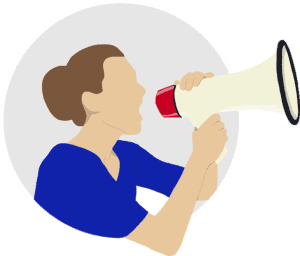
SMH = Shaking my head
We use this in response to something that is disappointing, surprising, shocking, or hard to believe.
TBH = To be honest
We use this when we are going to express our honest opinion, especially if that opinion is somewhat negative or controversial.
TIL = Today I learned
We use this when we learn something knew and often surprising. TIL tomatoes are technically a fruit, not a vegetable.
TFW = That feeling when
This is used to express an emotion we feel when something happens – it’s often accompanied by an image that illustrates the expression. TFW you finish work on Friday afternoon.

TL;DR = Too long; didn’t read
When someone writes a LOT of text to express their point, other people might respond with TL;DR because it was too long, too much text. Sometimes people who write a lot of text will also write TL;DR and then a 1-2 line summary of the long text, to help people who don’t want to read the whole thing.
TMI = Too much information
When someone shares things that are extremely private and personal – especially details about their medical issues or sex life – which might make other people uncomfortable to hear, the other people might react with TMI.

WRT = With respect to
This simply means “regarding” or “about” a certain topic.
WTH / WTF = What the hell / What the fuck
These are slightly rude expressions that express shock or outrage. If your friend drives home after drinking an entire bottle of wine – an action that’s very dangerous, you could say WTF was he thinking?!?
YMMV = Your mileage may vary
This expression means “you may or may not succeed / have good results” = in other words, good results are not guaranteed. Maybe someone asks for diet advice and you share a diet strategy that has worked for you, but you tell them YMMV – it worked for you, but it might not work for everyone, so they should not expect 100% certainty that they will be successful with it.
Like I said, there are so many more of these! You probably know some more that weren’t in this lesson, so if you’d like to add a few, post them in the comments.
To keep learning from me, come check out my online English courses. They’ll help you learn English fast and improve all your skills without wasting time. You can click on the link to see the available courses and try some free sample lessons!
Thanks for joining me today, and I’ll talk to you in next week’s video.


